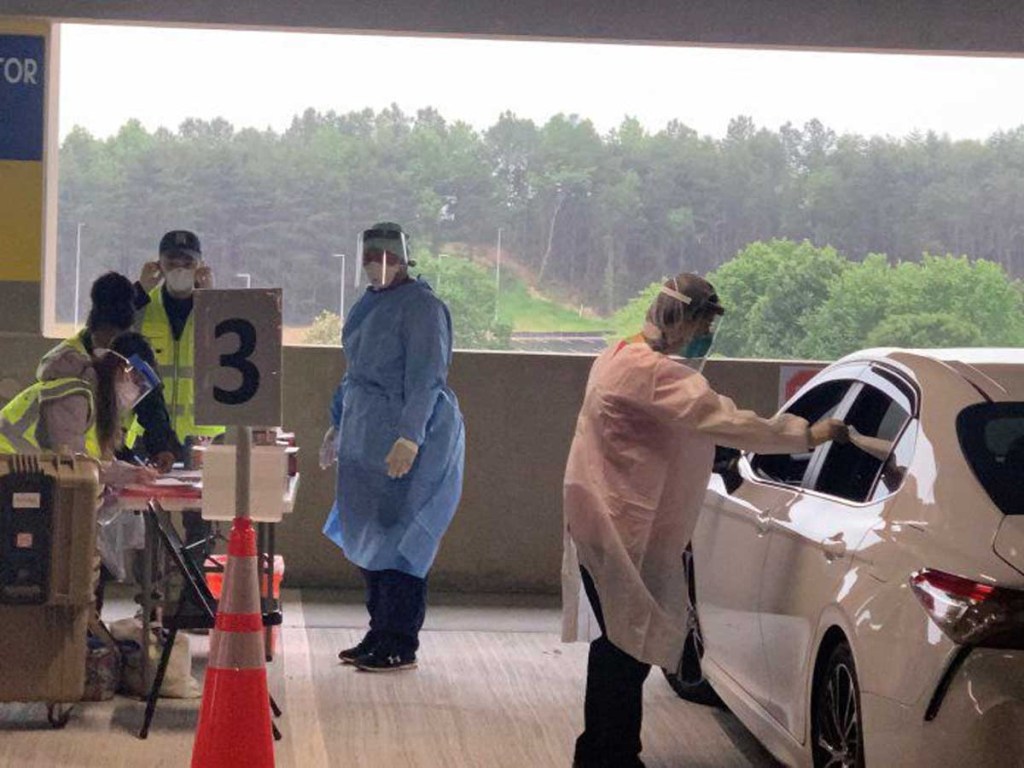Contact tracing next attack in battle against new coronavirus
Published 10:04 am Tuesday, May 12, 2020

- Nurses took nasal swab samples during a large-scale COVID-19 testing operation Friday at Gwinnett County's Infinite Energy Center off of Sugarloaf Parkway.
LAWRENCEVILLE, Ga. — A steady stream of cars moved in and out of Gwinnett County’s Infinite Energy Center’s parking deck late last week as people answered the call of state officials urging them to find out whether they are carrying COVID-19, the disease caused by the new coronavirus.
It’s the fourth time the East Metro Health District held a large-scale, free COVID-19 testing event as the state continues to expand its testing capacity after falling behind most of the rest of the country. Drive-through testing sites like the one Gwinnett hosted Friday are popping up in communities across Georgia as health officials rush to make tracking the novel coronavirus more efficient.
About 1,200 people who felt like they had the telltale symptoms of a dry cough, a low-grade fever or lack of taste and smell drove up to the parking deck that is typically filled with fans attending a rock show or monster truck rally at the center’s arena. Other candidates for a test Friday included health care and other front line workers and people who are especially vulnerable, including seniors and people with compromised immune systems.
People waited an average of 10 minutes to get tested on Friday.
Public health officials are pulling plans for other kinds of health emergencies off the shelf and adapting them to this pandemic as Georgia begins its third month of disrupting businesses and social interaction to contain the spread of COVID-19.
“We’ve actually planned for mass vaccinations, so this is a very similar setup to that,” District Health Director Dr. Audrey Arona said. “So when we were tasked with performing tests for COVID-19, we just basically modified that a little bit to fit this and the efficiency is incredible.”
Last week, Gov. Brian Kemp opened the door for anyone in Georgia to get tested regardless of whether they feel sick or not.
“Now the only requirement is an appointment,” said Chad Wasdin, spokesman for the Gwinnett district that also covers Newton and Rockdale counties. “Every health district across the state is working diligently to expand its testing capacity.”
Arona says opening up the testing criteria will help ease the minds of more Georgians and help public health officials gain a better understanding of the virus. The appointments are necessary so that health departments can manage the test kits supply, she said.
“The other part is that we will by testing more people, even asymptomatic people, we’re going to be able to get a feel for really what level of transmission of COVID-19 is having in our communities, in our counties, in our state,” Arona said.
The rapid ramp up of testing is putting a strain on labs and their ability to deliver results to the people who anxiously await results.
Drive-through testing
Just a few weeks ago, many Georgians were hard-pressed to find a testing site near their community even if they met the criteria state health officials required to get checked out. As April ended, the governor made expanded testing his top priority in the fight against COVID-19 and his weekly press conferences routinely promoted the role the Georgia National Guard is playing in the deployment.
Now the state’s website listing of COVID-19 testing sites includes many with ongoing operations. The Gwinnett pop-up test site that opened for a day last week supplements those.
Gwinnett County police directed drivers into the deck, where about 40 East Metro Health District employees pulled the paperwork associated with the appointment.
Minutes later, the cars pulled into designated parking spots, and soon after a nurse gathered a sample with a nasal swab.
In roughly 48 hours, each person was supposed to be able to find out their test results online.
If someone tests positive, a health department epidemiologist will contact them before results go online.
That kick-starts checking their progress while under self-quarantine and contact tracing, finding out who else the person recently encountered to track the spread.
“We put them in this monitoring system so that we can monitor them for their quarantine period of time to find out if they then become a case themselves,” Arona said.
And while the state’s ability to test more people increases, so does the pressure on having enough resources to track down each person someone infected with COVID-19 met.
In the coming weeks, the state aims to hire 1,000 people, including students studying medicine and public health, to assist with contact tracing, Department of Public Health Commissioner Dr. Kathleen Toomey said at a press conference last week announcing the expanded testing parameters.
“This is more than an epidemiologic activity,” she said. “This is a logistical deployment and we want to make sure we have the experts in to help us.”





